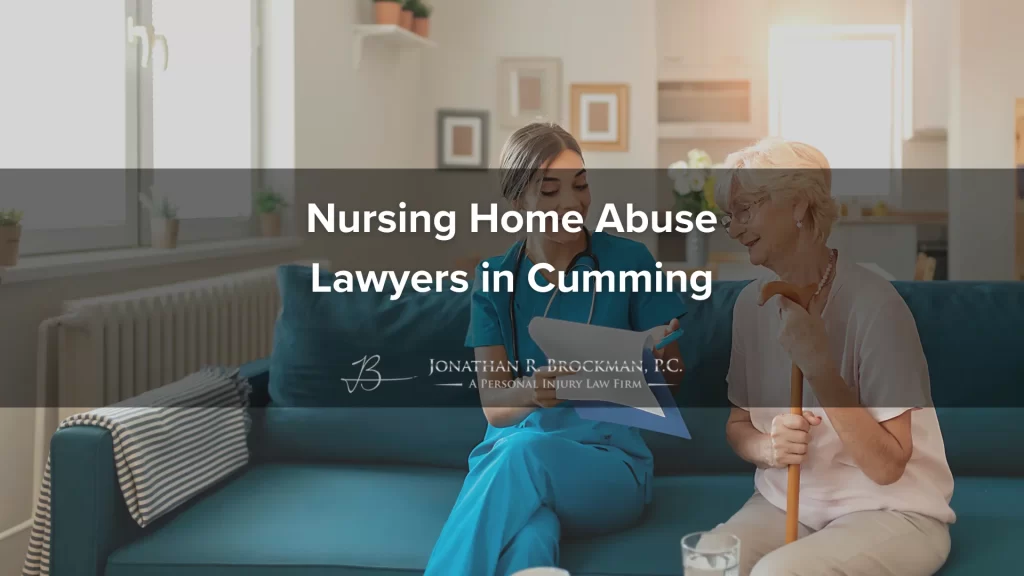
Did your loved one get hurt in a nursing home? Was it the result of abuse? If so, Jonathan R. Brockman, P.C. and our team of dedicated professionals will help your family seek compensation for their suffering.
When you move your loved one into a nursing home, you assume the staff will take excellent care of them. You never think someone could become abusive and cause physical or emotional harm, especially to someone who’s unable to defend themselves.
Elder abuse is, unfortunately, pervasive throughout the country. Nearly one out of three U.S. nursing homes have been issued citations for abuse, and it’s believed that abuse is significantly underreported.
Many types of abuse could occur in nursing homes, from physical abuse, to emotional abuse, to financial abuse. If your loved one suffered injuries or passed away because of someone’s abusive, negligent actions, call 770-205-8827, and one of our Cumming nursing home abuse attorneys will help you fight for justice.
Nursing Home Abuse Comes in Different Forms
There are five main types of abuse that occur in nursing homes: physical, emotional/psychological, sexual, financial, and neglect. Each can cause injuries or fatalities. There are various symptoms that indicate an elderly patient might be experiencing abuse. If you notice any of the signs below, you should seek help immediately.
Physical Abuse
Physical elder abuse is the intentional act of causing an injury or trauma to an older adult through physical contact. This can occur in a nursing home when a staff member kicks, strikes, pushes, shakes, burns, or slaps a patient. There are various signs you should watch for if you believe your loved one is the victim of physical abuse.
- Tooth loss
- Sprains
- Chronic treatment for similar injuries
- Unexplained, cuts, bruises, or burns
- Broken or fractured bones
- Hair loss
- Dislocated joints
- Fear of specific individuals at the nursing home
Emotional or Psychological Abuse
When a person causes someone emotional distress, pain, or fear, that’s considered emotional or psychological abuse. It may take the form of the following:
- Name-calling
- Intimidation
- Terrorizing
- Verbal assault
- Denying access to belongings
- Isolation
- Threatening
- Humiliation
Unfortunately, this type of abuse is difficult to spot. The signs can be subtle. Most often, the resident doesn’t have physical symptoms or visible signs of any emotional trauma. It’s crucial that you pay close attention to your loved one’s behavior and contact a Cumming nursing home abuse lawyer if you notice the following signs:
- Low self-esteem
- Depression
- Insomnia or change in sleeping patterns
- Mood swings
- Trouble eating
- Avoiding eye contact with others
- Feeling uncomfortable around specific people
- Withdrawing from family, friends, and activities
Sexual Abuse
Sexual abuse includes unwanted or forced sexual acts between the perpetrator and victim. This includes sexual contact with a patient who has a physical or mental disability, such as dementia. Signs could include the following:
- Panic attacks
- Pain or bleeding in the genital or anal area
- Difficulty sitting or walking
- Pelvic injuries
- Torn or bloody underwear
- Emotional or social withdrawal
- Development of an STD
- Bruised genitals or inner thighs
Financial Abuse
Financial abuse occurs when one party misappropriates financial resources or illegally gains control of another person’s finances, and it causes harm. It doesn’t happen as often as the other types of abuse; however, it does happen. It’s important to look for the common warning signs if you suspect a staff member has taken advantage of your loved one because of their financial standing. Warning signs include:
- Transfer of assets your loved one isn’t aware of
- Personal property, cash, assets, or other items that go missing without explanation
- Bank statements mailed to the perpetrator’s home
- A specific individual who shows an unusual interest in your loved one’s finances
- Discontinued utilities, unpaid bills, or eviction notice
- Unexplained decrease in an account balance
- Letters from creditors or collection agencies
- ATM withdrawals your loved one didn’t make
Neglect
Neglect is the result of a caregiver failing to provide their patient with adequate care. There are four categories of neglect:
- Medical: Failure to provide medical care or prevent harm.
- Basic needs: Failure to provide water, food, clean living area, safe facility, and other basic human needs.
- Personal hygiene: Failure to assist with grooming, showering, laundry, etc.
- Social or emotional: Leaving the resident alone for extended periods, ignoring their requests for assistance, treating them poorly, and failure to provide other types of social or emotional care.
When a nurse or staff member neglects their patient, it could result in a range of medical issues, such as:
- Bedsores
- Dehydration
- Malnutrition
- MRSA
- Influenza
- Respiratory infection
- Poor hygiene
- Infection
- Death
The most common warning signs you shouldn’t ignore include:
- Unsanitary living conditions
- Poor hygiene
- Dehydration or malnutrition
- Unexplained injuries
- Lack or loss of mobility
- Psychological issues, such as anxiety, fear, or anger
Why Nursing Home Abuse Occurs
Nursing home abuse is surprisingly prevalent. It’s shocking how often it happens considering the caregiver’s number one responsibility is to keep their patients safe. Unfortunately, there are numerous reasons for abuse and neglect in these facilities, and they all involve staffing.
Inexperienced Staff
Many nursing homes don’t perform thorough background checks on prospective employees. They end up hiring staff members who have no idea what they’re doing. They don’t know how to interact with patients or provide adequate medical care. That causes people to cut corners or skip crucial steps when caring for residents.
Inexperienced staff might not understand how to read a patient’s chart. They could administer the incorrect medication or dosage of medication that causes health problems. Most often, basic needs aren’t met, such as providing water or food.
Negligent Hiring
Nursing homes are supposed to adequately check a candidate’s credentials, such as certifications, licensing, previous employment, criminal record, credit checks, drug testing, medical history, and other information. Sometimes management will save money by skipping the screening process or only performing a minimal background check.
Without checking someone’s full history, the facility might not realize they’re hiring someone with prior assault convictions. That puts their residents at risk of physical abuse. If a nurse lied about their education and professional background, they might not be able to perform CPR in an emergency. Proper vetting can catch red flags and ensure inexperienced and unqualified employees don’t end up working at nursing homes.
Inadequate Training
Someone fresh out of school or who just completed their certification program will need to undergo extensive training. Nursing homes each have protocols for dealing with residents and procedures to follow in an emergency. New employees should receive proper training by a senior staff member or an administrator.
If the facility doesn’t provide training programs, nurses and other staff won’t know how to provide proper medical care. They’ll most likely forget to check a patient for bedsores and change their clothing or bedding. They also won’t know how to spot infections and treat them. Lack of training leads to staff who treat their patients poorly and are unable to prevent them from getting hurt or sick.
Understaffed Facility
Overworked nurses might take out their anger and frustrations on their patients. If there aren’t enough staff members to handle the workload, patient care will suffer. When there are too many responsibilities on anyone’s plate, mistakes happen. Employees will neglect their patients while completing other tasks or become violent with a resident because they feel stressed.
Understaffing is a common problem. Over time, the individuals who feel overwhelmed by their duties might quit without notice. That could cause additional problems for the already overworked staff that are still there. Nursing facilities must realize the importance of hiring enough people to handle each patient, so no one’s health suffers.
Fight for Your Loved One’s Rights and Seek the Justice They Deserve
 If you think your loved one is experiencing abuse at their nursing home, you should take immediate action. Follow the steps below to keep them safe and ensure you’re able to recover financial compensation.
If you think your loved one is experiencing abuse at their nursing home, you should take immediate action. Follow the steps below to keep them safe and ensure you’re able to recover financial compensation.
- Remain calm and respectful. Don’t confront staff members directly or cause a scene at the nursing home. If you accuse someone of abuse without proof or threaten them with legal action, that could make the situation worse.
- Speak with your loved one directly about how they sustained their injuries and why they’re exhibiting specific abuse symptoms. Ensure no one is around when you’re having the conversation, so they feel comfortable being honest with you about what happened.
- Report the incident to the facility. You can also call the police and file a report with them.
- Remove your loved one from the nursing home immediately or transfer them to a hospital to treat their injuries.
- Maintain detailed records of communication with the nursing home, your loved one’s medical records, and other documents associated with the case.
- Hire a Cumming nursing home abuse lawyer to handle your case’s legal aspects so you can focus on caring for your loved one.
Schedule Your Free Consultation Today
At Jonathan R. Brockman, P.C., we understand the anger you feel after discovering your loved one was the victim of abuse. You want to make sure the nursing home and staff members responsible face consequences. They should pay for the suffering your loved one endured and provide compensation for the expenses that resulted from the injury.
When you hire us, we’ll be by your side throughout the entire case. You’ll always be a priority for us. We’ll maintain open and honest communication so you know what to expect next. You can count on our legal team to treat you with respect and compassion during this difficult time.
Speak to one of our Cumming nursing home abuse lawyers today by calling 770-205-8827. We’ll schedule your free consultation and advise you on the legal options available for pursuing compensation.
